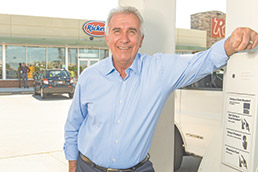Subscriber Benefit
As a subscriber you can listen to articles at work, in the car, or while you work out. Subscribe Now (IBJ Photo/ Eric Learned)
(IBJ Photo/ Eric Learned)Jay Ricker has grown his Anderson-based Ricker Oil Co. to 56 stores after launching it in 1979 as a petroleum-products supplier.
The industry has changed immensely since the company bought its first service station 10 years later. One example: Ricker offers its own credit card to customers, which gives them a discount on the price of gas and lets the company avoid paying credit card transaction fees.
Now, as convenience stores offer much more than simply gasoline, Ricker, 65, and his children are positioning themselves to stay competitive in a business dominated by large corporations.
You’re still smaller than the national chains. What’s your strategy to compete?
In this industry, you need to have the right products for your customer, just like any industry. You can’t rely on tobacco; that’s a declining product down the road. And gasoline cars have better mileage than they used to, so they take less gas.
So where you really need to grow is your food offering and, in our case, it’s proprietary. We’re a Subway franchisee. But we’ve developed our own Mexican type of food. And it is customizable and it’s fairly high-end in its ingredients. We’ll have that out in 10 stores by the end of the year and probably another 10 to 15 next year.
What is your opinion on convenience stores being able to sell cold beer?
As it’s well-known, we were one of those that entered the lawsuit against the state.
We think it’s antiquated. It’s the only state in the United States where you’re prohibited from selling a product cold, when it’s beer. And it really doesn’t make any sense because we can sell cold wine, which has a higher alcohol content than beer, which can only be sold warm.
The liquor stores have been a very effective opponent. Grocery stores, convenience stores, drugstores haven’t been able to overcome that obstacle so far.
The discounts you offer on gas stemmed from a disagreement with the credit card companies. How did that come about?
Two of our [national] study-group members actually pioneered the concept, one out of Syracuse, New York, and one out of Savannah, Georgia. And we saw how it worked. We tweaked it and we rolled it out.
We knew it had been very successful for them, and you don’t have to pay a credit card fee. We give the discount to the consumer instead. It’s been very successful for us. I think it’s a way to differentiate ourselves from our competitors.
How much do stations make on every gallon of gas they sell, and what’s the biggest misconception the public has about gas prices?
The margin on gasoline varies and, after fees a lot of times, it’s around 6 cents.
It’s not a high-margin product. And that might be a misconception. It seems like people are of two thoughts: Either they know we don’t make a lot on gas or they think we make a lot of money on gas. Obviously, we don’t make a lot of money on it, but it is a traffic-builder. A lot of people only buy gasoline and never come in the stores.
What we have is an attractive offering for them [inside]. So they come into the stores where there’s a higher margin on those products.
Convenience stores are much more now than gas, sodas and candy bars. Where do you see them in 20 years?
If you had asked me 20 years ago what we were going to sell today, I don’t know if I would have had the mix right. I think it’s going to be whatever consumers want.
Convenience stores are part of the fabric of the country. A huge percentage of the population is in a store on a weekly basis to buy some product.
Services may be one of the things down the road—we might run our own ATM network at our stores. I don’t know. We might be a pickup spot for Amazon. There have been a lot of things tested; some things flop miserably. There are new products all the time that come out of the stores.•
Click here for other interviews.
Please enable JavaScript to view this content.
